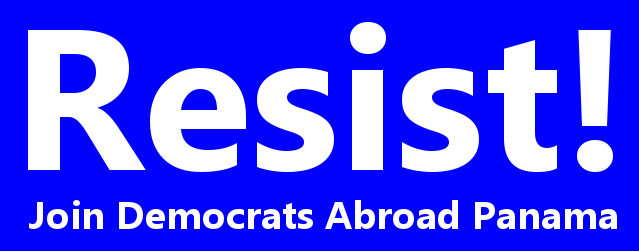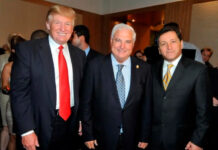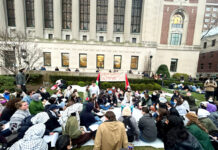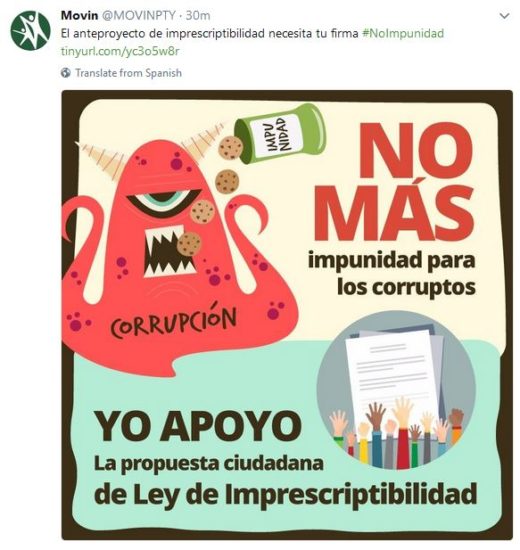
Panama’s malaise
by Eric Jackson
The communists are setting aside their divisions and are on the move. Same with the capitalists. This time, however, it’s not ostensibly against one another, but for the same purpose.
Class war? If you believe the stuff about a “political class” you might call it that. However, better to call it a political caste, which derives from most social classes. Call it a caste of shifting rival cults of the politically connected. At the bottom of the range are often poverty-stricken people who sell their votes. Perhaps a notch above are low-paid functionaries in temporary government jobs — or seeking such — which they get by extracurricular work passing out bags of groceries, sheets of roofing zinc, small amounts of money and so on to those who would give their votes in exchange. Above these are the officeholders or candidates to be such. Then there are government contractors, often small fry whose goal is to fatten into big fish. Higher up are the party bosses. Higher yet are very wealthy persons, natural or juridical, foreign or domestic, who pay large sums of money into the political machines to get even more valuable things that they want. These are the adepts of a culture for whom public affairs are a personal or family business. It’s not so much a class as a caste.
Do we want to talk about church and state as Siamese twins of a sort? It’s more complicated than that. The Templo Hosanna and some other Evangelical churches were allied with and beneficiaries of the Martinelli administration. Now, in light of the scandals, they are denying all and forming their own political party. The Catholic Church has been in that position with other administrations, but decades ago the Vatican renounced and forbade partisan affiliations. Now, under Pope Francis, the usual political games are frowned upon by a knowing Latin American prelate even as the church receives the deeds from the Varela administration to properties that were nationalized long ago.
But FRENADESO and its heart, the SUNTRACS construction workers’ union, which trace roots to the faction of communists who never made their peace with the dictatorship, and other unions like the Coca-Cola workers’ syndicate with the unpronounceable long acronym historically associated with the more orthodox commies who at one point allied themselves with General Torrijos and his dreaded G2 chief Manuel Antonio Noriega, are marching in the streets together. At a September 9 gathering at the University of Panama, these and other labor and leftist formations announced a series of demonstrations and militant street actions intended to force the convening of a constituent assembly. It may be trite and have proven ineffective many times over many years, but that’s what they come up with as a way out of what they see as an acute corruption crisis.
Meanwhile, business and professional organizations that have sometimes been rivals, most prominently the Chamber of Commerce (CCIAP) which represents business owners large and small, the Panamanian Business Executives Association (APEDE) which represents people who manage businesses that are often not their own, plus members of some of the wealthiest families like the Mottas, are singing much the same song. They’re denouncing corruption, criticizing the legal system for its ineffectiveness at fighting it and calling for constitutional changes that President Juan Carlos Varela promised in his campaign but won’t support now.
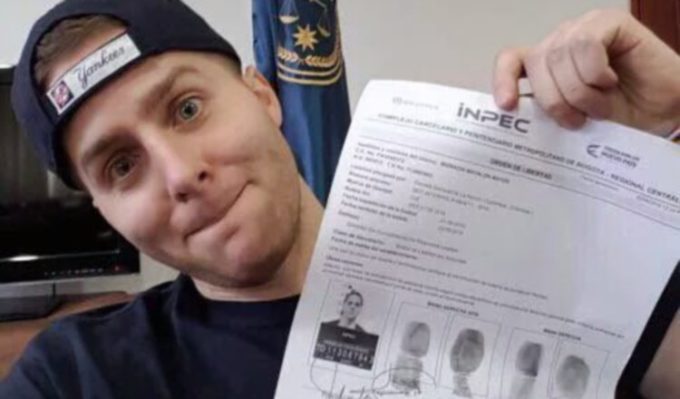
The usual? Perhaps. But it’s different now.
Bribery and graft are well known features of the Panamanian government landscape and were such long before Ricardo Martinelli’s rise to power. The dozens of criminal cases arising from his administration might be called banal. Examples of similar behavior can be shown from prior times. But compared to past examples the previous administration’s corruption was far more systematic, and the ongoing abuses of the legal system are more obvious and flagrant, so as to add up to a qualitative difference.
Take, for example, a Martinelli administration contract whose stated initial purpose, shorn of the national security rhetoric, was the destruction of public records. The Martinelli era Governmental Innovation Authority — AIG by its Spanish acronym — arranged with the son of Ricardo Martinelli’s brother-in-law (not by Martinelli’s sister but from a prior marriage) to buy an email encryption program that would allow, at least on a partial basis, for public officials to effectively “erase” emails already sent. This was promoted on “national security” grounds, to minimize inadvertent breaches by officials of the National Police, the Security Ministry, prosecutors and the Ministry of the Presidency.
Thus young Mayer Mizrachi, through his mother the scion of the Cable & Wireless fortune and perhaps the richest family in Jamaica, got an AIG contract for more than $200,000 for his start-up tech company, Criptext, to install such a program in the cell phones of officials who handle sensitive information. He was paid nearly $205,000 for this. Criptext software was installed on the devices of some AIG functionaries, but not in those of any of the officials handling sensitive information as in the stated purpose for the contract. It seems that the question of how such a system would pass muster under Panama’s Transparency Law was not considered.
There were other priorities. First, Innovative Venture (Mayer Mizrachi’s Criptext sales company) got its more than 200 grand, and within a few days about half of that amount was transferred through the accounts of a company owned by Aaron “Ronny” Mizrachi, Mayer’s father, Caribbean Holding Service, to GFI Investment SA, the latter company anonymously owned under Panamanian law but linked to then AIG director Eduardo Jaén by his confidential secretary being the signer of the company’s checks.
(Ronny Mizrachi and Caribbean Holding Service? Those were the conduits for the purchase of Israeli electronic eavesdropping equipment that is at the center of the case that has Ricardo Martinelli in a Miami jail fighting extradition. Ronny’s is one of the names that comes up again and again in the Financial Pacific brokerage house cases. The man is wanted on suspicion of cheating Panama on contracts to bury utility cables in Panama City. He was in a position to affect contracts between Cable & Wireless and Panama’s securities agencies, for example the street surveillance cameras. The ex-president’s brother-in-law is a fugitive who may have as many as five passports, probably including countries that would protect him from INTERPOL.)
Mayer Mizrachi was living in the USA despite an INTERPOL red note warrant asking for his arrest, and even selling Criptext software to a few local governments in that country. Did he think himself untouchable? He flew to Cartagena as a tourist and was arrested at the airport by Colombian authorities.
Were bribes paid? Colombian officials alleged that Mayer Mizrachi got released from custody pending extradition that way, which he denied. In Panama, it was somehow managed to get the warrant for his arrest called off, but that move was stalled pending appeal. Finally the Colombians washed their hands of the matter, not allowing the younger Mizrachi to fly off to the destination of his choosing but forcibly sending him to Panama, where he was taken into custody but soon enough granted bail, with the provision that he must not leave Panama while charges are pending.
Co-defendants in the Criptext software contract case? Eduardo Jaén and three former AIG employees who worked under him, in addition to Mayer Mizrachi. Jaén, who is charged in other cases, is held in preventive detention while the others are out on bail. This is the embezzlement of government funds case, but it’s easy enough to see that there could also be a money laundering case that might snare the elder Mizrachi.
So where is this case going? Perhaps nowhere. Brought more than two and a half years ago, with the formal investigation concluded nearly two years ago, the preliminary hearing has been scheduled and then called off five times. No new date is set because the defendants have raised a series of interlocutory appeals that are stalled in the Superior Court. If these go against the defendants, expect the decisions to be appealed again to the Supreme Court, taking further time.
The aim is to run out the calendar on the statute of limitations. It’s possible because Panama has no effective tolling law — a set of rules that stops the count toward a case going too stale to prosecute during times when the accused is a fugitive, or while delays like interlocutory appeals or hearings put off because a lawyer is sick are interposed.
Multiply that game by nearly 100 criminal cases and you have the general picture of what’s going on in the face of a widespread public demand to bring Mr. Martinelli and his scores of thieves to justice.
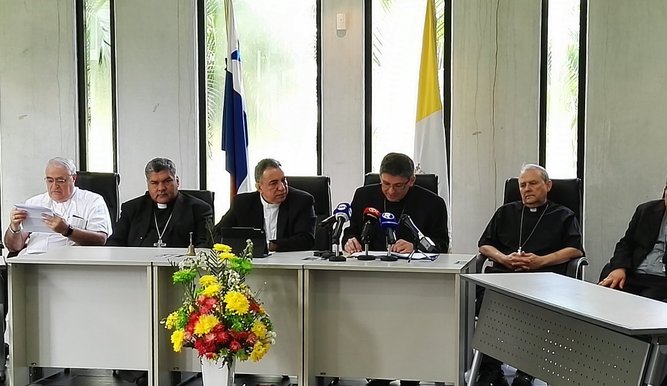
Why now?
The situation has become acutely inflamed of late for four main reasons:
- The most notorious case of them all during the Martinelli administration itself was the overpriced and arguably unnecessary purchases of radar installations, digital mapping services and helicopters from the Italian state-controlled aerospace and defense company Finmeccanica. Ricardo Martinelli is an Italian citizen by descent and in a dry but legally sneering aside US federal magistrate Edwin G.Torres made reference to the former president’s Italian passport but the likelihood that he would not want to flee there because the Italians have a warrant for his arrest in that matter. The Supreme Court, however, just threw out the charges in the most egregious of the Finmeccanica cases, alleging that prosecutors continued the investigation after the time to complete it had expired.
- The high court also declined to take one of the cases against Ricardo Martinelli, the one about the irrigation system for Tonosi that was paid for but never built. Cases against several other principals in that, who don’t have the immunity that the former president does, continue under the jurisdiction of the Public Ministry prosecutors and the ordinary courts. Noteworthy in that embezzlement and bribery case are the alleged involvements of former Vice President Felipe “Pipo” Virzi (who served as that in the Pérez Balladares administration and whose family is intermarried with Martinelli’s) and Virzi’s now extinct Banco Universal, and of the now shuttered Financial Pacific brokerage house.
- There is an international situation in which much of Latin America is reeling under corruption scandals. The old formula of letting the gringos solve everything is seen as patently ridiculous with Donald Trump in the White House. Local high and mighty players are ever less treated as such. It started out in Brazil, with an investigation about crooked dealings between the state-owned Petrobras oil company and the private Odebrecht conglomerate which has large-scale construction as its core business. Politicians of left and right are named there. The incumbent president Michel Temer, who assumed office when the elected Dilma Rousseff was removed, may have a corrupted congress backing him but he’s political buzzard chow with single-digit approval ratings. Despite presidential and congressional attempts to strangle the anti-corruption investigations by cutting off funding the Brazilian police, prosecutors and courts won’t obey. Revelations from their investigations about corporate sins abroad are driving processes in much of the rest of the region. The Odebrecht bribery scandal, notwithstanding denials all the way around, seems to have engulfed both Venezuela’s Chavista government and its right-wing opposition. In Ecuador, former President Rafael Correa is incensed but his chosen successor, Lenin Moreno, has turned on the vice president and others in that left faction, also over allegations of corrupt dealings with that Brazilian company. The entourages of Colombia’s President Juan Manuel Santos and his predecessor Álvaro Uribe — who is now a rival — are both implicated in Odebrecht bribe allegations. So are the current governments of Mexico, Argentina and the Dominican Republic and major political factions in Peru. Unrelated corruption cases and attempts to sweep them under the rug dominate the politics of Guatemala, Honduras and El Salvador. The old colonial mother country, Spain, has a share of the Odebrecht money laundering operation among its very many ongoing political scandals and in that weakened state faces a crisis over Catalan attempts at secession. Not only does information from many of these countries’ troubles have a Panama connection, but more importantly all across the Spanish-speaking and Portuguese-speaking world, a sense of respect for and deference to governing powers is largely lost.
- And then there’s Attorney General Kenia Porcell’s declaration: “…There are economic, political, business, media and banking powers that are attempting to prevent the investigations from being completed.” Her subordinate prosecutors complain of threats against themselves. Most notably from the Catholic bishops, but from the top to the bottom of society — including, weakly, from President Varela — comes the demand for more information. Who threatened what? Who is attempting to obstruct and how? Why isn’t anyone being taken away in handcuffs for obstructing or threatening a prosecutor?
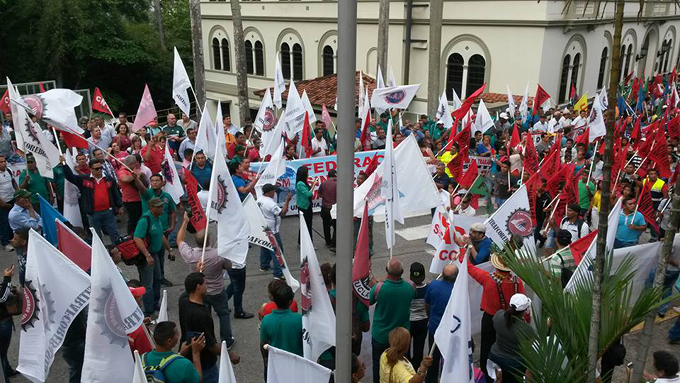
What to do?
The post-invasion constitutional system is stalemated. Even if President Varela reluctantly convenes an election of delegates for a constitutional convention that he figures that he would not be able to control, would those elections feature the same hacks coming around with cash, groceries, household appliances and building materials to buy votes for the same old, same old? Or would angry neighbors resist such persons, or socially shun those who take from them? If the political caste were routed and business and labor, left and right, were all amply represented at a convention, would they be able to agree on very much?
Consider the generalities, although of course there are exceptions. Everybody hates the Supreme Court. Everybody hates the legislature. Everybody knows that Panama’s systems of justice, public education and financing local government are all broken. Perhaps there could be a constitutional reform that just deals with those points of consensus and leaves the rest to the ordinary squabbles of representative democracy.
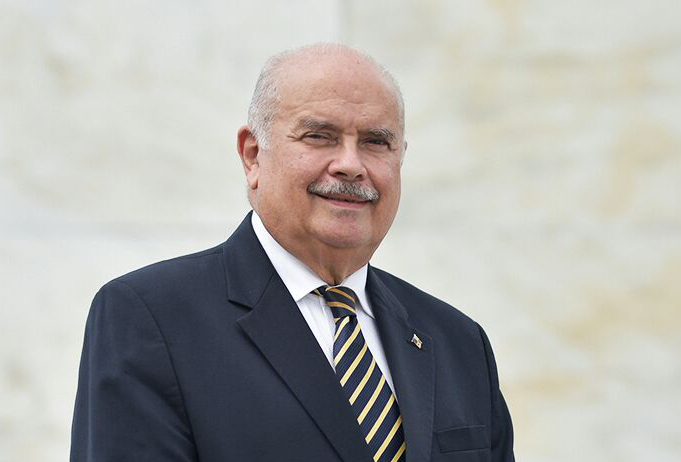
But how to get from here to there?
Look for known players to do what they know. Lawyers will sue. Candidates and their backers will develop electoral strategies. The commie radicals will block the roads. The wealthy power brokers will think about on whom to bet their money. Civic and business organizations will issue proclamations of high moral principle or low practical common denominators. Panama has seen all of that for so many years, without much change.
However, the belief that Panama is in a deep crisis that won’t go away yet must go away is widespread and palpable. Will it dissipate with a muffled whimper, or boil over in a sudden rage? Will 2019 be a “throw them ALL out” election? Are we bound, a generation after the disaster that ended the last one, for another coup d’etat?
Certainly this reporter is no prophet. But it does seem that what’s going on now can’t be sustained and that something will have to give.
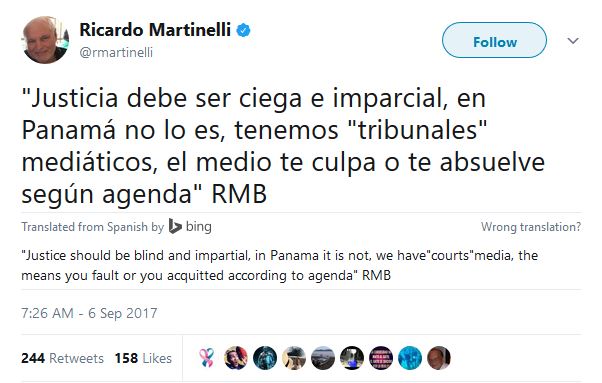
~ ~ ~
These announcements are interactive. Click on them for more information.



